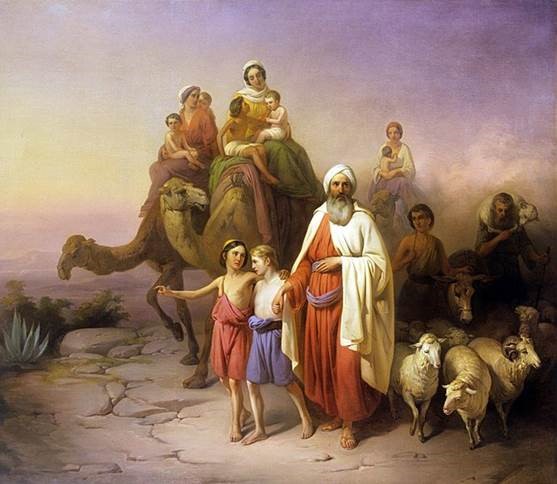Shabbat Lech Lecha Shalom

Abraham’s Journey from Ur to Canaan by Jozsef Molnar, 1850
by Phyllis Chesler
Divine Providence always, always seems to lead me to exactly what I need as I contemplate each parsha. This time, I was immediately led to an enchanting song by Eliad Eliyahu, “Kumi Ulechi Lach,” based on a poem by Rachel Bluwstein titled “Benachar,” (“in a foreign country, nechar”) and also to the Safed kabbalists, specifically Rabbi Shlomo Halevi Alkabets who gave us “Lecha Dodi,” an “aliyah” in spiritual terms, the divine Shabbat prayer. In a soulfully sweet voice, Eliyahu celebrates “Aliyah Day”—and takes us right back to this week’s parsha. Eliyahu begins with a version of God’s command to Avram:
“Get up and go, what do you
have in this foreign country?….
A silent command shall hear
the yearning for the homeland…
Leave the upheaval behind
The water will go up, and the
blessing will come…
And the songs shall come
again to your borders.”
I am uplifted and comforted by both the lyrics and the music, so much so that I will not focus on the multiple themes and questions always raised by this parsha: Did Avram once worship idols too? Did he, as midrash suggests, smash his father’s idols? But didn’t Terach also give up idols since he left Ur Kasdim and went as far as Haran? Wasn’t this former idol-worshipper also on the way to the Promised Land?
But mainly: Why-oh-why did God choose Avram? What was it about him that led God to choose him? And then there’s this: Avram’s decision to hand the beautiful Sarai over to Pharaoh in order to save his own life, ultimately/possibly led to the acquisition of Hagar and to all that was to follow—for which Sarah blames Avram. Once Hagar becomes pregnant, Hagar looks down on the barren Sarai who then turns on Avram and says: “Chamesi Alecha.” (16:5). “This is all your fault, I am angry at you.” And finally, why don’t people understand that God promised that through Avram “all the families of the earth will be blessed”? (12:3).
A sweet Shabbat Shalom.